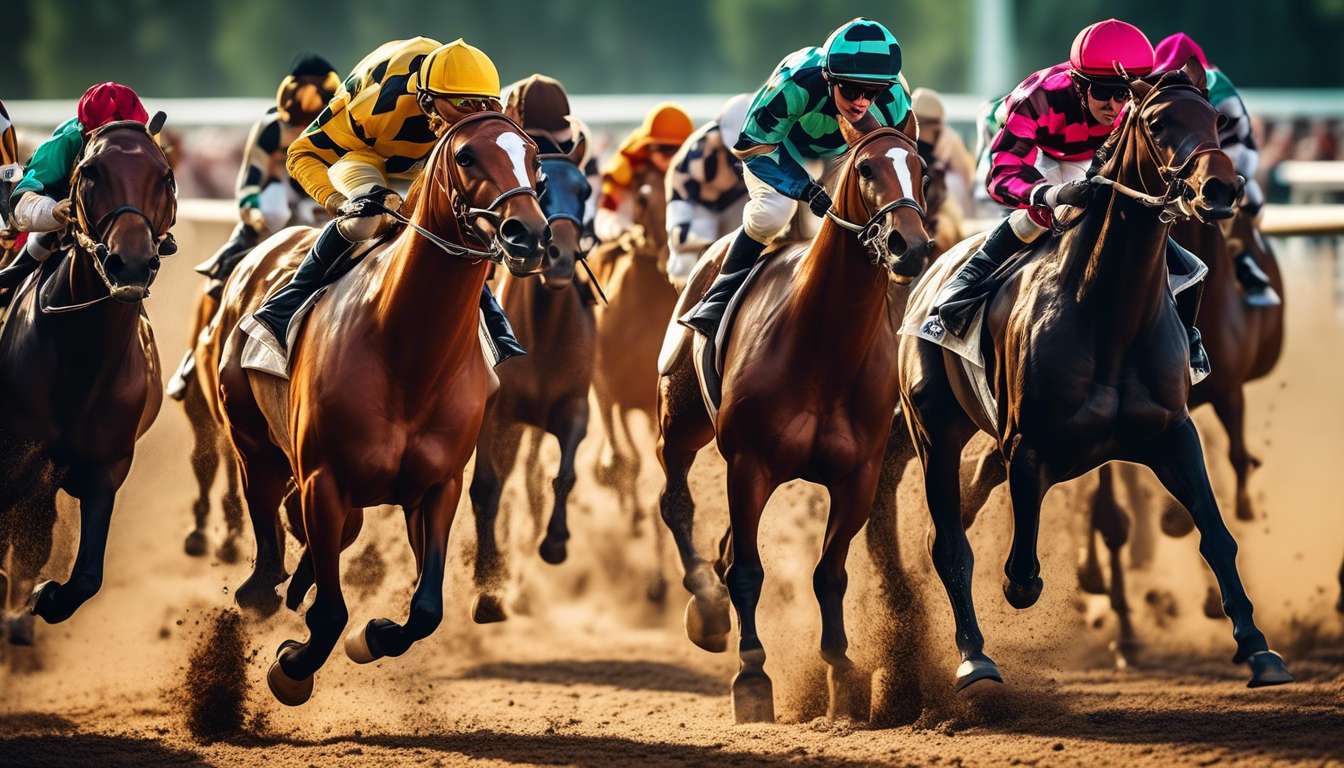As avid enthusiasts of horse racing, we share a common thrill in exploring the dynamic world of betting strategies, particularly within the esteemed realm of William Hill. This article is our opportunity to delve into the intricate art and science behind wagering on these majestic creatures, where every decision can turn the tide of fortune.
Together, we will navigate the complexities of odds, study the form guides, and unearth the nuances that might just give us that winning edge. Our collective experience has taught us that successful betting is not merely about luck but about informed choices and strategic thinking.
By examining various strategies, we aim to enhance our approach and maximize our chances of success. Key strategies include:
-
Analyzing Horse Performance
- Past race results
- Jockey history
- Horse’s health and fitness
-
Understanding Track Conditions
- Weather impact
- Track surface type
- Impact on different horse breeds
Let’s embark on this journey together, exploring the rich tapestry of betting strategies to uncover new insights and refine our skills in the exhilarating world of William Hill horse racing.
Horse Form Analysis
Analyzing a horse’s form is crucial for predicting its performance in upcoming races. When we gather at the track or discuss strategies for William Hill horse racing, understanding a horse’s past performances unites us in our shared passion. We dive into race histories, noting how a horse performed under various conditions, such as different tracks or distances. This knowledge gives us a sense of belonging in the horse racing community as we share insights and tips with fellow enthusiasts.
Key factors in horse form analysis include:
- Recent Races: Focus on recent performances to gauge a horse’s current condition.
- Win Percentages: Evaluate how often the horse has won.
- Margins of Victory or Defeat: Consider the extent of wins or losses.
- Time Between Races: Assess the horse’s fitness levels based on rest periods.
Through this collective effort, we strengthen our bond with each other, feeling more connected as we develop strategies together.
At William Hill horse racing, our shared analysis becomes a thrilling journey, making every race a chance to deepen our camaraderie and excitement.
Jockey Tactics Evaluation
Evaluating jockey tactics requires analyzing several key components:
- Decision-making skills
- Adaptability during races
- Ability to communicate effectively with the horse
Together, as a community of William Hill horse racing enthusiasts, we know that a jockey’s choices can significantly impact the outcome of a race.
A jockey’s quick thinking and strategic moves are crucial. These include:
- When and how to position the horse
- Deciding the right moment to make a move
These decisions can make all the difference between winning and losing.
In the thrilling world of William Hill horse racing, we must pay close attention to how well jockeys adapt to the ever-changing dynamics of a race. Their ability to adjust strategies on the fly, based on real-time developments, truly showcases their expertise.
Let’s not overlook the bond between jockey and horse. Effective communication and understanding can lead to a harmonious partnership that consistently delivers results.
By evaluating these tactics, we can feel more connected to the racing community and improve our betting strategies.
Weather Influence Examination
Weather’s Impact on Horse Racing
Weather plays a critical role in horse racing outcomes, affecting everything from track conditions to horse performance and jockey strategy. As we delve into the world of William Hill horse racing, understanding how weather factors into our betting strategies can make a significant difference.
Effects of Weather on Racing Conditions
- Rain transforms a firm track into a softer one, which favors specific horse breeds and racing styles.
- Excessive heat can impact a horse’s stamina, altering the race dynamics.
Community Insights and Learning
Our community thrives on sharing insights and learning from each other. By examining past races, we can identify patterns where weather conditions have swayed outcomes, helping us make informed bets.
- Trainers might adjust their training regimes based on anticipated weather, giving us clues on which horses to watch.
Human Element: Jockey Strategy
We can’t overlook the human element. Jockeys adapt their strategies according to weather conditions, which affects their performance.
By considering these factors, we can enhance our betting tactics and feel more connected to the William Hill horse racing experience.
Track Surface Assessment
Understanding Track Surfaces in Horse Racing
Understanding the different track surfaces and how they impact race outcomes is crucial for refining our betting strategies. At William Hill horse racing, we often encounter various surfaces like turf, dirt, and synthetic. Each surface has its unique characteristics that can significantly influence a horse’s performance. By recognizing these differences, we can better predict which horses are likely to shine on race day.
Types of Track Surfaces:
-
Turf Tracks
- Known for their softer ground.
- Favor horses with a strong stride and agility.
-
Dirt Tracks
- Typically harder surfaces.
- Suit horses with raw speed.
-
Synthetic Tracks
- Offer a more consistent surface.
- Minimize weather-related variables, leveling the playing field.
Betting Strategy Insights:
-
Consider recent races on similar surfaces, as past performance can be a strong indicator of future success.
-
Use knowledge of track surfaces to enhance betting strategies and strengthen the community’s understanding of William Hill horse racing.
Together, we can make informed choices and celebrate our shared passion for horse racing.
Breed Suitability Analysis
Analyzing breed suitability can significantly enhance our betting strategies by identifying which horse breeds excel on specific track surfaces. By understanding the characteristics and strengths of different breeds, we can make informed decisions when placing bets on William Hill horse racing.
Examples of Breed Performance:
- Thoroughbreds might perform better on dirt tracks due to their speed and endurance.
- Quarter Horses could dominate shorter, faster races.
This knowledge allows us to feel more connected to the racing community, as we share insights and experiences with fellow enthusiasts.
Our Approach:
- Research past performances.
- Correlate performances with track conditions.
This data-driven method helps us pinpoint which breeds thrive under certain circumstances, offering us a sense of camaraderie and shared purpose.
By aligning our strategies with breed suitability, we enhance our chances of success and deepen our involvement in the thrilling world of horse racing. As we continue to explore William Hill horse racing, let’s leverage breed insights for smarter betting.
Betting Odds Calculation
Calculating Betting Odds
Understanding betting odds involves grasping both probability and potential payouts to make informed wagers. In the realm of William Hill horse racing, odds reflect an event’s likelihood and determine potential returns. Demystifying these numbers can significantly improve betting strategies.
Understanding Odds and Payouts
Odds indicate how much one can win relative to their stake.
- For example, fractional odds like 5/1 mean winning five units for every unit staked if the chosen horse wins.
Translating Odds into Probabilities
Grasping how odds translate into probabilities is crucial.
- For instance, odds of 5/1 imply a 16.67% chance of success. This is calculated by the formula:
[ \text{Probability} = \frac{1}{(\text{Odds Ratio} + 1)} \times 100 ]
Assessing Value in Odds
By understanding these calculations, bettors can better assess whether the odds offered by William Hill present good value.
- It’s essential to find a balance between risk and reward to ensure bets are smart and informed decisions.
Conclusion
Harnessing this knowledge can enhance the collective experience in William Hill horse racing, moving beyond just placing bets to making strategic decisions.
In-Play Betting Strategies
In-play betting strategies allow us to make real-time decisions based on a horse race’s unfolding dynamics. As we watch the race, our instincts and observations come into play. We’re not just passive spectators; we’re part of a community that thrives on the thrill and camaraderie of horse racing.
With William Hill horse racing, we have the tools to place bets as events unfold, adjusting our strategies to the race’s tempo and unexpected twists.
Timing is crucial when engaging in in-play betting. As part of a savvy group of punters, we know that reacting swiftly to changes can enhance our betting outcomes. Key changes to watch for include:
- A favorite horse lagging behind
- An underdog showing unexpected strength
We share insights and build on each other’s knowledge, creating a collective wisdom that enriches our experience. By staying informed and connected, we make better decisions, enjoying not just the potential rewards, but the shared excitement that comes with being part of this vibrant community.
Bankroll Management Techniques
Effective bankroll management is crucial for sustaining long-term success and enjoyment in horse racing betting. At William Hill Horse Racing, we recognize that managing our funds wisely can be the difference between thriving and merely surviving.
Setting a Clear Budget:
- Establish a budget that you are comfortable risking.
- This creates a safer and more enjoyable betting environment for everyone.
Wagering Strategy:
- Commit to wagering only a small percentage of your bankroll on each race.
- This approach reduces the impact of inevitable losses and allows you to capitalize on winning streaks.
Tracking and Learning:
- Track your bets meticulously.
- Review your successes and learn from mistakes.
- Sharing insights and supporting each other’s growth builds a sense of community.
By embracing the discipline of bankroll management at William Hill Horse Racing, we can foster a collective culture where we’re not just betting, but betting smart. Let’s make our journey both rewarding and fun!
What are the most common pitfalls for beginners in horse racing betting?
When it comes to horse racing betting, the most common pitfalls for beginners include:
- Lack of research
- Chasing losses
- Not setting a budget
To avoid these pitfalls, it’s essential to:
-
Understand the basics of horse racing: Take time to research and learn about the horses, jockeys, and race conditions.
-
Avoid emotional decisions: Make decisions based on data and analysis rather than emotions or hunches.
-
Practice responsible bankroll management: Set a budget for your betting activities and stick to it.
By approaching betting with a level head and a well-thought-out strategy, newcomers can navigate the exciting world of horse racing more successfully.
How can I use historical race data to improve my betting decisions?
When we analyze historical race data, we gather valuable insights to enhance our betting decisions. By studying past performances, we can:
- Identify patterns
- Track trends
- Pinpoint factors that could influence the outcome of future races
This data empowers us to make informed choices, increasing our chances of success.
Harnessing historical race data allows us to approach our betting strategies with a strategic and calculated mindset, ultimately leading to more favorable outcomes.
What are some tips for identifying value bets in horse racing?
To identify value bets in horse racing, there are several factors to consider:
-
Odds and Recent Performances:
- Always pay attention to the odds.
- Analyze the horse’s recent performances.
-
Current Form Analysis:
- Consider factors such as track conditions.
- Evaluate jockey performance.
-
Research and Comparison:
- Conduct thorough research.
- Compare odds from different bookmakers to spot potential value bets.
By staying informed and trusting your analysis, you increase your chances of finding those profitable opportunities on the racetrack.
Conclusion
In conclusion, when exploring betting strategies for William Hill horse racing, it is crucial to focus on several key elements:
Horse and Race Analysis:
- Thoroughly analyze horse form.
- Evaluate jockey tactics.
- Consider the influence of weather.
- Assess the track surface.
- Analyze breed suitability.
Betting Strategies:
- Calculate betting odds carefully.
- Utilize in-play betting strategies.
- Implement effective bankroll management techniques.
By combining these elements, you can enhance your chances of making informed and strategic bets for a successful horse racing experience.




